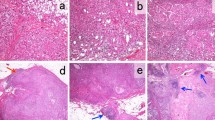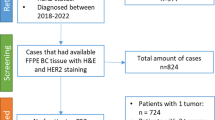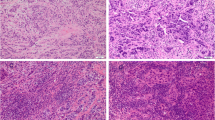Abstract
Purpose
The aim was to evaluate the role of tumor-infiltrating lymphocytes (TIL) in predicting molecular response after preoperative endocrine or cytotoxic treatment for HR+/HER2− patients who do not achieve a pathological complete response.
Methods
Stromal (Str) TIL were centrally evaluated on samples from diagnostic core-biopsies of HR+/HER2− patients included in two prospective randomized trials: the LETLOB trial (neoadjuvant endocrine-based treatment) and the GIOB trial (neoadjuvant chemotherapy-based treatment). Pre- and post-treatment Ki67 was centrally assessed.
Results
StrTIL were evaluable in 111 cases (n = 73 from the LETLOB trial and n = 38 from the GIOB trial). Median StrTIL was 2%. Patients with high StrTIL (StrTIL ≥10%, n = 28) had more frequently breast cancer of ductal histology (p = 0.02), high grade (p = 0.049), and high Ki67 (p = 0.02). After neoadjuvant endocrine treatment (LETLOB cohort), a significant Ki67 suppression (p < 0.01) from pre- to post-treatment was observed in both the low and high StrTIL groups. High StrTIL patients achieve more frequently a relative Ki67 suppression ≥50% from baseline as compared to low StrTIL patients (55 vs. 35%, p non significant). After neoadjuvant chemotherapy (GIOB cohort), a significant Ki67 suppression was observed only for low StrTIL patients (Wilcoxon p = 0.001) and not in the high StrTIL group (p = 0.612). In this cohort, the rate of patients achieving a relative Ki67 suppression ≥50% from baseline was significantly higher in the high vs low StrTIL group (64 vs. 10%, p = 0.003). Geometric mean Ki67 suppression was evaluated in each cohort according to StrTIL: the lowest value (−41%) was observed for high StrTIL cases treated with chemotherapy.
Conclusions
This hypothesis-generating study suggests that in HR+/HER2− breast cancer StrTIL at baseline may influence the achievement of a molecular response after neoadjuvant treatment. Further evaluation in large studies is needed, and interaction with the type of treatment warrants to be explored.




Similar content being viewed by others
References
Charehbili A, Fontein DB, Kroep JR, Liefers GJ, Mieog JS, Nortier JW, van de Velde CJ (2014) Neoadjuvant hormonal therapy for endocrine sensitive breast cancer: a systematic review. Cancer Treat Rev 40:86–92. doi:10.1016/j.ctrv.2013.06.00
Cortazar P, Zhang L, Untch M et al (2014) Pathological complete response and long-term clinical benefit in breast cancer: the CTNeoBC pooled analysis. Lancet 384:164–172. doi:10.1016/S0140-6736(13)62422-8
von Minckwitz G, Untch M, Blohmer JU, Costa SD, Eidtmann H, Fasching PA, Gerber B, Eiermann W, Hilfrich J, Huober J, Jackisch C, Kaufmann M, Konecny GE, Denkert C, Nekljudova V, Mehta K, Loibl S (2012) Definition and impact of pathologic complete response on prognosis after neoadjuvant chemotherapy in various intrinsic breast cancer subtypes. J Clin Oncol 30:1796–1804. doi:10.1200/JCO.2011.38.8595
Guarneri V, Piacentini F, Ficarra G, Frassoldati A, D’Amico R, Giovannelli S, Maiorana A, Jovic G, Conte P (2009) A prognostic model based on nodal status and Ki-67 predicts the risk of recurrence and death in breast cancer patients with residual disease after preoperative chemotherapy. Ann Oncol 20:1193–1198. doi:10.1093/annonc/mdn761
von Minckwitz G, Schmitt WD, Loibl S, Müller BM, Blohmer JU, Sinn BV, Eidtmann H, Eiermann W, Gerber B, Tesch H, Hilfrich J, Huober J, Fehm T, Barinoff J, Rüdiger T, Erbstoesser E, Fasching PA, Karn T, Müller V, Jackisch C, Denkert C (2013) Ki67 measured after neoadjuvant chemotherapy for primary breast cancer. Clin Cancer Res 19:4521–4531. doi:10.1158/1078-0432.CCR-12-3628
Ellis MJ, Tao Y, Luo J, A’Hern R, Evans DB, Bhatnagar AS, Chaudri Ross HA, von Kameke A, Miller WR, Smith I, Eiermann W, Dowsett M (2008) Outcome prediction for estrogen receptor-positive breast cancer based on postneoadjuvant endocrine therapy tumor characteristics. J Natl Cancer Inst 100:1380–1388. doi:10.1093/jnci/djn309
Prat A, Fan C, Fernandez A, Hoadley KA, Martinello R, Vidal M, Viladot M, Pineda E, Arance A, Muñoz M, Paré L, Cheang MC, Adamo B, Perou CM (2015) Response and survival of breast cancer intrinsic subtypes following multi-agent neoadjuvant chemotherapy. BMC Med 13:303. doi:10.1186/s12916-015-0540-z
Denkert C, Loibl S, Noske A, Roller M, Müller BM, Komor M, Budczies J, Darb-Esfahani S, Kronenwett R, Hanusch C, von Törne C, Weichert W, Engels K, Solbach C, Schrader I, Dietel M, von Minckwitz G (2010) Tumor-associated lymphocytes as an independent predictor of response to neoadjuvant chemotherapy in breast cancer. J Clin Oncol 28:105–113. doi:10.1200/JCO.2009.23.7370
Dieci MV, Griguolo G, Miglietta F, Guarneri V (2016) The immune system and hormone-receptor positive breast cancer: is it really a dead end? Cancer Treat Rev 46:9–19. doi:10.1016/j.ctrv.2016.03.011
Guarneri V, Generali DG, Frassoldati A, Artioli F, Boni C, Cavanna L, Tagliafico E, Maiorana A, Bottini A, Cagossi K, Bisagni G, Piacentini F, Ficarra G, Bettelli S, Roncaglia E, Nuzzo S, Swaby R, Ellis C, Holford C, Conte P (2014) Double-blind, placebo-controlled, multicenter, randomized, phase IIb neoadjuvant study of letrozole-lapatinib in postmenopausal hormone receptor-positive, human epidermal growth factor receptor 2-negative, operable breast cancer. J Clin Oncol 32:1050–1057. doi:10.1200/JCO.2013.51.4737
Guarneri V, Frassoldati A, Ficarra G, Puglisi F, Andreetta C, Michelotti A, Cresti N, Boni C, Bisagni G, Berardi R, Battelli N, Santoro A, Banna G, Bottini A, Di Blasio B, Maiorana A, Piacentini F, Giovannelli S, Jovic G, Conte P (2008) Phase II, randomized trial of preoperative epirubicin-paclitaxel ± gefitinib with biomarker evaluation in operable breast cancer. Breast Cancer Res Treat 110:127–134. doi:10.1007/s10549-007-9688-3
Salgado R, Denkert C, Demaria S et al (2015) The evaluation of tumor-infiltrating lymphocytes (TILs) in breast cancer: recommendations by an International TILs Working Group 2014. Ann Oncol 26:259–271. doi:10.1093/annonc/mdu450
R Development Core Team (2016) R R: A language and environment for statistical computing. R Foundation for Statistical Computing. Vienna, Austria. http://www.rproject.org/. Accessed on June 2016
Denkert C, von Minckwitz G, Darb-Esfahani S, Ingold Heppner B, Klauschen F, Furlanetto J, Pfitzner B, Huober J, Schmitt W, Blohmer J-U, Kümmel S, Engels K, Lederer B, Schneeweiss A, Hartmann A, Jakisch C, Untch M, Hanusch C, Weber K, Loibl S (2016) Evaluation of tumor-infiltrating lymphocytes (TILs) as predictive and prognostic biomarker in different subtypes of breast cancer treated with neoadjuvant therapy—a metaanalysis of 3771 patients. Abstract S1-09. Presented at the 39th San Antonio breast cancer symposium, December 6–10 2016, San Antonio, Texas, USA
Loi S, Sirtaine N, Piette F, Salgado R, Viale G, Van Eenoo F, Rouas G, Francis P, Crown JP, Hitre E, de Azambuja E, Quinaux E, Di Leo A, Michiels S, Piccart MJ, Sotiriou C (2013) Prognostic and predictive value of tumor-infiltrating lymphocytes in a phase III randomized adjuvant breast cancer trial in node-positive breast cancer comparing the addition of docetaxel to doxorubicin with doxorubicin-based chemotherapy: BIG 02-98. J Clin Oncol 31:860–867. doi:10.1200/JCO.2011.41.0902
Dieci MV, Mathieu MC, Guarneri V, Conte P, Delaloge S, Andre F, Goubar A (2015) Prognostic and predictive value of tumor-infiltrating lymphocytes in two phase III randomized adjuvant breast cancer trials. Ann Oncol 26:1698–1704. doi:10.1093/annonc/mdv239
Stanton SE, Adams S, Disis ML (2016) Variation in the incidence and magnitude of tumor-infiltrating lymphocytes in breast cancer subtypes: a systematic review. JAMA Oncol 2:1354–1360. doi:10.1001/jamaoncol.2016.1061
Issa-Nummer Y, Darb-Esfahani S, Loibl S, Kunz G, Nekljudova V, Schrader I, Sinn BV, Ulmer HU, Kronenwett R, Just M, Kühn T, Diebold K, Untch M, Holms F, Blohmer JU, Habeck JO, Dietel M, Overkamp F, Krabisch P, von Minckwitz G, Denkert C (2013) Prospective validation of immunological infiltrate for prediction of response to neoadjuvant chemotherapy in HER2-negative breast cancer–a substudy of the neoadjuvant GeparQuinto trial. PLoS ONE 8:e79775. doi:10.1371/journal.pone.0079775
Dunbier AK, Ghazoui Z, Anderson H, Salter J, Nerurkar A, Osin P, A’hern R, Miller WR, Smith IE, Dowsett M (2013) Molecular profiling of aromatase inhibitor-treated postmenopausal breast tumors identifies immune-related correlates of resistance. Clin Cancer Res 19:2775–2786. doi:10.1158/1078-0432.CCR-12-1000
Generali D, Bates G, Berruti A, Brizzi MP, Campo L, Bonardi S, Bersiga A, Allevi G, Milani M, Aguggini S, Dogliotti L, Banham AH, Harris AL, Bottini A, Fox SB (2009) Immunomodulation of FOXP3 + regulatory T cells by the aromatase inhibitor letrozole in breast cancer patients. Clin Cancer Res 15:1046–1051. doi:10.1158/1078-0432.CCR-08-1507
Author information
Authors and Affiliations
Corresponding author
Ethics declarations
Funding
The LETLOB study was sponsored and funded by GlaxoSmithKline; the GIOB study was sponsored and funded by Astrazeneca. Moreover, authors acknowledge the following fundings: Istituto Oncologico Veneto project L02P38; University of Padova project 60A07-7808/13.
Conflict of interest
The authors declare that they have no conflict of interest.
Ethical approval
All procedures performed in studies involving human participants were in accordance with the ethical standards of the institutional and/or national research committee and with the 1964 Helsinki declaration and its later amendments or comparable ethical standards.
Additional information
An erratum to this article is available at http://dx.doi.org/10.1007/s10549-017-4219-3.
Electronic supplementary material
Below is the link to the electronic supplementary material.
Rights and permissions
About this article
Cite this article
Dieci, M.V., Frassoldati, A., Generali, D. et al. Tumor-infiltrating lymphocytes and molecular response after neoadjuvant therapy for HR+/HER2− breast cancer: results from two prospective trials. Breast Cancer Res Treat 163, 295–302 (2017). https://doi.org/10.1007/s10549-017-4191-y
Received:
Accepted:
Published:
Issue Date:
DOI: https://doi.org/10.1007/s10549-017-4191-y




